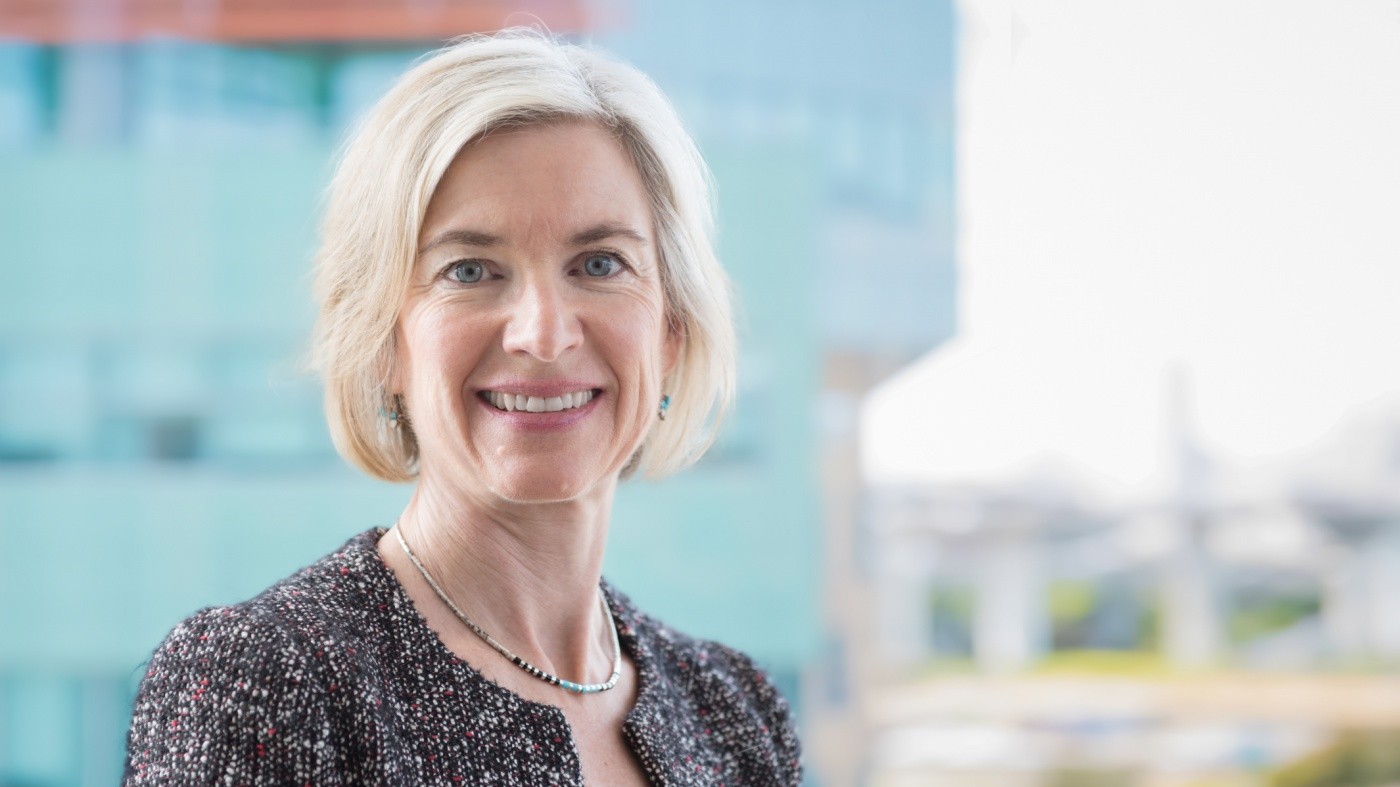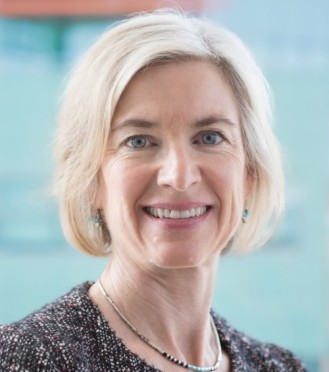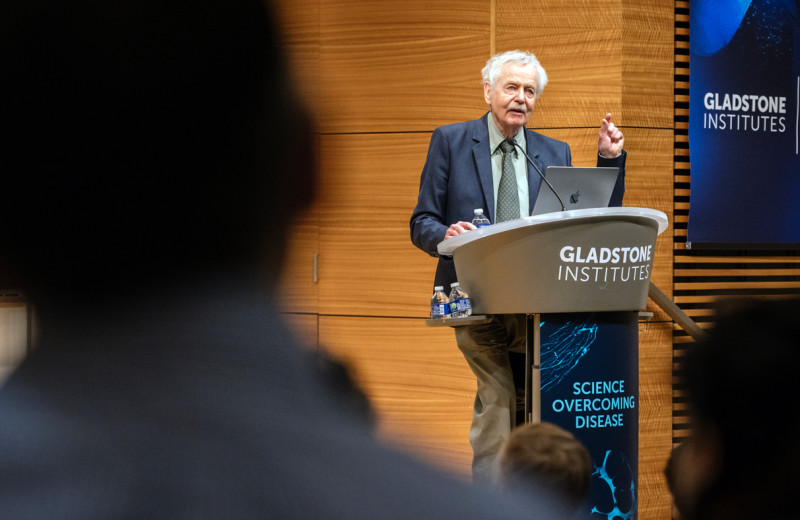Gladstone NOW: The Campaign Join Us on the Journey✕

Jennifer Doudna, senior investigator at Gladstone Institutes and professor at UC Berkeley, was awarded the 2020 Nobel Prize in Chemistry for her transformative co-discovery of the CRISPR-Cas9 technology.
Gladstone Senior Investigator Jennifer Doudna, PhD, was awarded the Nobel Prize in Chemistry for her transformative discovery of the CRISPR-Cas9 system, along with her long-time collaborator, Emmanuelle Charpentier, PhD, the scientific and managing director of the Max Planck Unit for the Science of Pathogens, in Berlin, Germany.
CRISPR-Cas9 is a gene-editing tool that allows researchers to precisely cut DNA in order to remove, replace, or add genes to a sequence. While it’s only been 8 years since Doudna first published the discovery, scientists around the world have rapidly adopted this technology for a wide range of research purposes. Scientists are currently using CRISPR-Cas9 to create disease models in human cells, identify therapeutic targets, diagnose viral infection, and repair genetic mutations.
Doudna joined Gladstone Institutes as a senior investigator in 2018 to help point her technology to biomedical problems, while also continuing to study CRISPR mechanisms in her lab at UC Berkeley, where she has been a professor since 2002.
At Gladstone, her lab is focused on using CRISPR technologies to study molecular mechanisms of disease. She is also working to establish ways to treat disease by cutting out or replacing harmful DNA in the body.
“Congratulations to Jennifer and her team on this momentous occasion,” says Gladstone President Deepak Srivastava, MD. “Her work has truly revolutionized biomedical research and I’m honored and excited that Gladstone is a part of her ongoing scientific discoveries.”
Doudna performed her graduate and postdoctoral work with two Nobel prize winners, Jack W. Szostak, PhD, and Thomas R. Cech, PhD. After her training, Jennifer started an independent lab studying RNA biology. During this time, she uncovered novel biochemical functions of RNAs and led the field in the discovery of RNA 3-dimensional structures.
Doudna made history in 2012, when she and Charpentier described for the first time the power of the CRISPR-Cas9 gene-editing system. Since this discovery, Doudna has stayed at the forefront of this field, developing CRISPR-based tools for biotech applications, and studying the function of other Cas proteins.
“This great honor recognizes the history of CRISPR and the collaborative story of harnessing it into a profoundly powerful engineering technology that gives new hope and possibility to our society,” says Doudna. “What started as a curiosity‐driven, fundamental discovery project has now become the breakthrough strategy used by countless researchers working to help improve the human condition. I encourage continued support of fundamental science as well as public discourse about the ethical uses and responsible regulation of CRISPR technology.”
Doudna has spearheaded the public debate around the ethical implications of using CRISPR-Cas9 to edit human embryos, focusing on safety and need to proceed with great care.
Doudna is now the second Nobel Prize–winning investigator at Gladstone. She joins the company of Senior Investigator Shinya Yamanaka, MD, PhD, who won the Nobel Prize in Medicine or Physiology in 2012 for his discovery of induced pluripotent stem (iPS) cells.
In addition to her work at Gladstone, Doudna is the president of the Innovative Genomics Institute, a partnership between UC Berkeley and UC San Francisco, that aims to apply genome engineering technology to improve human health. She is also an investigator with the Howard Hughes Medical Institute (HHMI).
For Media
Julie Langelier
Associate Director, Communications
415.734.5000
Email
About Gladstone Institutes
Gladstone Institutes is an independent, nonprofit life science research organization that uses visionary science and technology to overcome disease. Established in 1979, it is located in the epicenter of biomedical and technological innovation, in the Mission Bay neighborhood of San Francisco. Gladstone has created a research model that disrupts how science is done, funds big ideas, and attracts the brightest minds.
Featured Experts
Support Discovery Science
Your gift to Gladstone will allow our researchers to pursue high-quality science, focus on disease, and train the next generation of scientific thought leaders.
A Sculptor of Modern Regenerative Medicine
A Sculptor of Modern Regenerative Medicine
Among his myriad accomplishments, Rudolf Jaenisch—winner of the 2025 Ogawa-Yamanaka Stem Cell Prize—was the first to demonstrate the potential of induced pluripotent stem cells to treat disease.
Awards Ogawa Stem Cell Prize Profile Regenerative Medicine Stem Cells/iPSCsSix Gladstone Scientists Named Among World’s Most Highly Cited Researchers
Six Gladstone Scientists Named Among World’s Most Highly Cited Researchers
The featured scientists include global leaders in gene editing, data science, and immunology.
Awards News Release Corces Lab Doudna Lab Marson Lab Pollard Lab Ye LabBringing Modern Science to Vitamin Biology: Isha Jain Wins NIH Transformative Research Award
Bringing Modern Science to Vitamin Biology: Isha Jain Wins NIH Transformative Research Award
Leveraging modern scientific tools and techniques, Jain intends to transform our understanding of the critical roles that vitamins play in health and disease.
Awards News Release Cardiovascular Disease Jain Lab Metabolism




